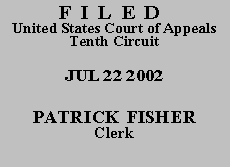

| SAMUEL C. HOWARD,
Petitioner - Appellant, v. JAMES L. SAFFLE, Warden; THE ATTORNEY GENERAL OF THE STATE OF OKLAHOMA, Respondent - Appellee. |
|
Petitioner Samuel C. Howard, an Oklahoma prisoner proceeding pro se, seeks a certificate of appealability (COA) to allow this court to review the merits of the district court's order denying his petition for writ of habeas corpus, brought pursuant to 28 U.S.C. § 2254. See 28 U.S.C. § 2253(c)(1)(A) (unless COA issues, appeal may not be taken from denial of § 2254 petition). He also seeks leave to proceed on appeal in forma pauperis, a request we grant.
Following a jury trial, petitioner was convicted of unlawful delivery of a controlled drug after former conviction of a felony. He was sentenced to fifty years' imprisonment, based on the jury's recommendation of that term. On direct appeal, he challenged the sufficiency of the evidence to support his conviction. The Oklahoma Court of Criminal Appeals affirmed.(1) Petitioner's application for post-conviction relief was denied, and that decision was affirmed on appeal.
In his federal habeas corpus petition, petitioner claimed that (1) his sentence should be modified to ten years; (2) the information failed to set forth the essential elements of the crime alleged; (3) he was denied due process in the state post-conviction proceedings; (4) he was denied an appeal from the state court's order denying post-conviction relief; (5) he did not receive a full and fair hearing of his claims on direct appeal, and (6) trial and appellate counsel were ineffective in preserving issues (1) through (5) for review.
The magistrate judge recommended that the first two claims be denied as procedurally barred and further determined that trial and appellate counsel were not ineffective for failing to raise these issues. The court further found that the information adequately set forth the elements of the offense. The magistrate judge recommended denial of the balance of petitioner's claims for failure to raise issues of federal constitutional concern. After consideration of petitioner's objections, which focused on the alleged ineffective assistance of trial and appellate counsel, the district court adopted the magistrate judge's report and recommendation and denied the petition.
We have reviewed the report and recommendation adopted by the district court and concur for substantially the reasons stated therein.(2) Petitioner has, therefore, failed to demonstrate that "reasonable jurists could debate whether (or, for that matter, agree that) petitioner should have been resolved in a different manner or that the issues presented were adequate to deserve encouragement to proceed further." Slack v. McDaniel, 529 U.S. 473, 483-84 (2000) (quotation omitted). Petitioner has thus failed to make "a substantial showing of the denial of a constitutional right" as required for issuance of a COA. See 28 U.S.C. § 2253(c)(2).
Accordingly, we DENY petitioner's application for a COA and DISMISS the appeal.
Entered for the Court
Circuit Judge
*. This order and judgment is not binding precedent, except under the doctrines of law of the case, res judicata, and collateral estoppel. The court generally disfavors the citation of orders and judgments; nevertheless, an order and judgment may be cited under the terms and conditions of 10th Cir. R. 36.3.
1. After he was sentenced, the trial judge conducted a 120-day review as provided for in Okla. Stat. tit. 22 § 982a (1983). The court reduced petitioner's sentence to twenty years. The state then petitioned the court of criminal appeals seeking reinstatement of the fifty-year term. The court of criminal appeals granted the state's request, holding that the trial judge lacked authority to reduce petitioner's term because of the prior felony conviction. See id.
2. We note that to the extent the magistrate judge relied on our earlier decisions suggesting a "dead-bang winner" argument as the test for determining effective appellate advocacy, we have since returned to the standards enumerated in Strickland v. Washington, 466 U.S. 668 (1984). See Neill v. Gibson, 278 F.3d 1044, 1057 n.5 (10th Cir. 2001), petition for cert. filed (U.S. May 6, 2002) (No. 01-10121). The district court nonetheless conducted its overall review correctly under Strickland.